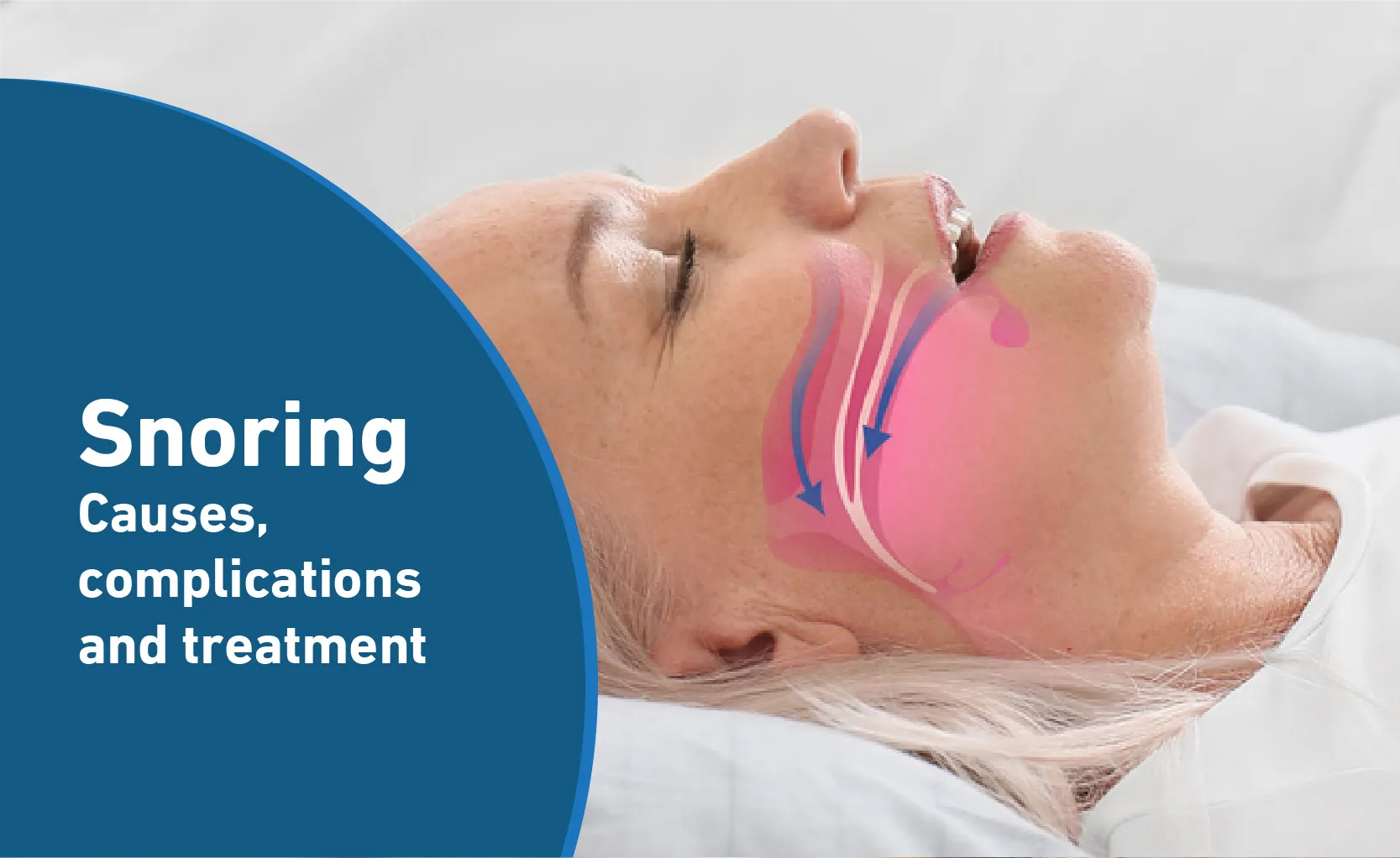Snoring, causes, complications and treatment
Introduction to the problem:
- Snoring is a very common problem for most people, you cannot find someone who does not know what it is or has not suffered from it – at least – once in his life.
- Snoring is that annoying sound that comes from the airway when sleeping, and is characterized by a hoarse or thick sound.
- Snoring is a problem that may accompany a person intermittently and does not cause other symptoms or serious complications, and it may be – on the other hand – a life-threatening problem, and has serious complications if accompanied by other symptoms that we will talk about in this article.
Is snoring a separate disease or just a symptom of another problem?
Snoring is not a disease in itself, but a symptom of another problem, which may be simple or serious.
What are the causes of snoring?
- In normal cases, the muscles surrounding the airway in the pharynx and mouth are contracted, which keeps the airway open and air passing properly to the lungs.
- But when these muscles relax during sleep, the airway becomes smaller and narrower, reducing the flow of air into the lungs. The passage of air through the soft tissues (due to the relaxation of the muscles that control them) causes them to vibrate, producing the noise we are talking about, which is snoring.
- And this is not the only reason, but anything that may cause obstruction in the airway during sleep may cause snoring.
So we can now learn about the famous and well-known causes of snoring:
- Partial obstruction of the airway in the nose and pharynx, as occurs in cases of inflammation and allergies, and the accumulation of fat in the throat tissues as in cases of obesity.
- In some cases, the muscles of the pharynx become weak, such as: aging, alcohol consumption, or some sedatives.
- Anatomical deformities in the respiratory tract, such as a deviated nasal septum or enlarged tonsils and adenoids.
Can snoring cause serious complications?
- If snoring is the main and only symptom, and if it is an intermittent problem that does not cause any other symptoms and does not affect lifestyle, then snoring is unlikely to cause serious complications.
But in certain cases, snoring is a symptom of a bigger problem, which is obstructive sleep apnea (OSA). In this case, what happens is that breathing stops completely for a few moments before returning again, and in this case it may cause serious complications that may include stroke, multiple heart problems, and high blood pressure.
To distinguish between this condition and normal snoring, there are some symptoms and signs that, when present, increase the likelihood of having an obstructive sleep apnea problem, which requires consulting a specialist doctor. These are:
- Strong and sudden snoring during sleep, which is repeated several times.
- Stopping breathing during sleep, and this is noticed by the bed partner or a family member.
- Waking up frequently at night.
- Severe headache upon waking up in the morning.
- Feeling tired and very lethargic during the day and at work.
- Feeling dry mouth and throat as soon as you wake up.
What are the different ways to treat snoring?
There are several ways to treat snoring, ranging from simple lifestyle modifications to surgery, depending on the causes and severity of symptoms.
▫ Modifying lifestyle behaviors:
- Losing weight in cases of obesity.
- Avoiding alcohol, sedatives, and smoking.
- Changing the sleeping position to a comfortable position, such as using a tilted mattress or pillow, and avoiding sleeping on the back.
▫ Conservative treatments:
- Decongestants.
- Continuous positive airway pressure (CPAP): A mask is placed over the nose and mouth during sleep to protect the airway from closing, and to provide a continuous supply of oxygen to the lungs during sleep.
- Oral appliances: Some special oral appliances may be used to adjust the position of the jaw and mouth during sleep.
▫ Snoring surgeries:
The term “surgery” may raise a bit of a sudden concern for you, as you may think that snoring is just a simple symptom that does not require surgery! But in fact, sometimes surgery may be the most appropriate and best solution to control snoring, as in cases of:
- Obstructive sleep apnea; to avoid complications.
- Enlarged tonsils or adenoids; They must be removed.
- Failure of other conservative treatments.
- Chronic snoring; which affects the quality of life such as the partner’s discomfort from this recurring problem.
The available surgical options are:
- Removal of tonsils or adenoids.
- Surgeries to correct nasal septum deformities.
- Surgeries to correct the position of the upper or lower jaw.
- Surgeries to remove excess soft tissue in the pharynx, which can be performed by laser or radiofrequency.
In the end, snoring is a common problem that should not cause serious harm to the individual or his life partner, and in many cases, conservative treatment is the best option, but in other cases, snoring becomes a constant enemy of the person, causing a lot of boredom and life and social disturbances, so do not hesitate to consult us to help you control your problem for a better and more stable life for you





